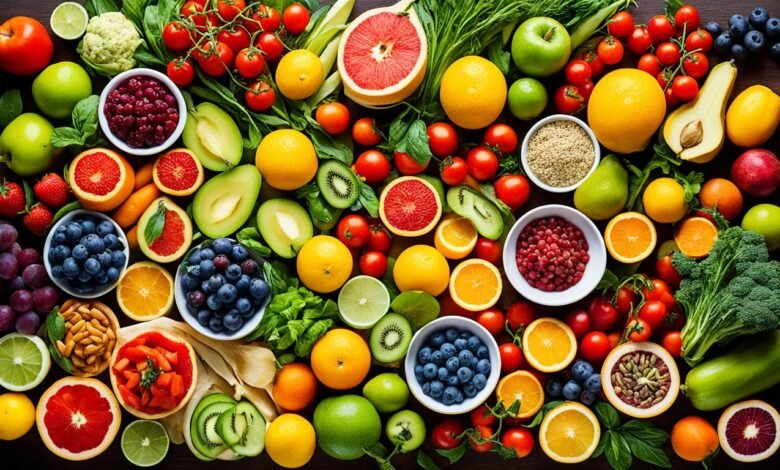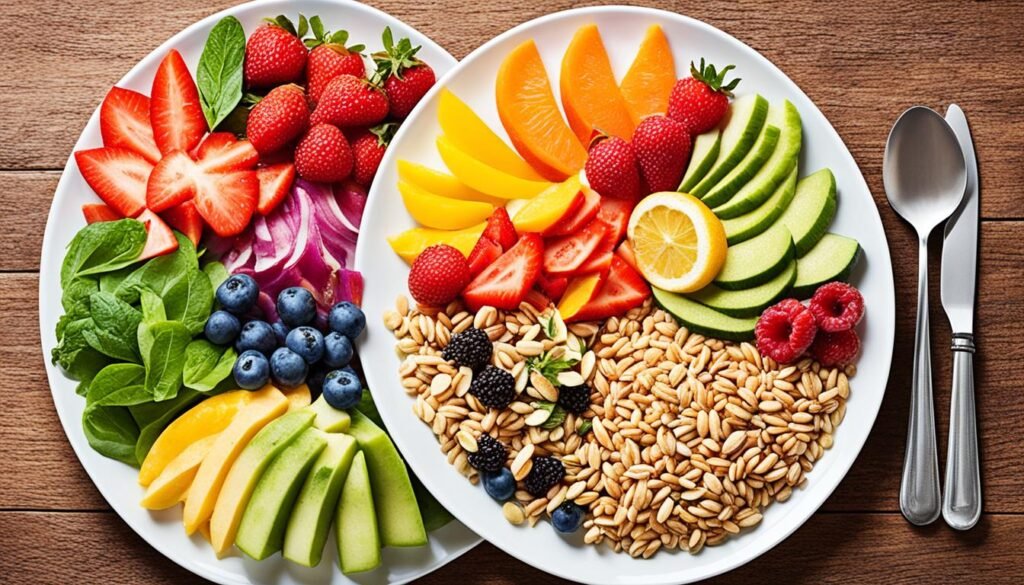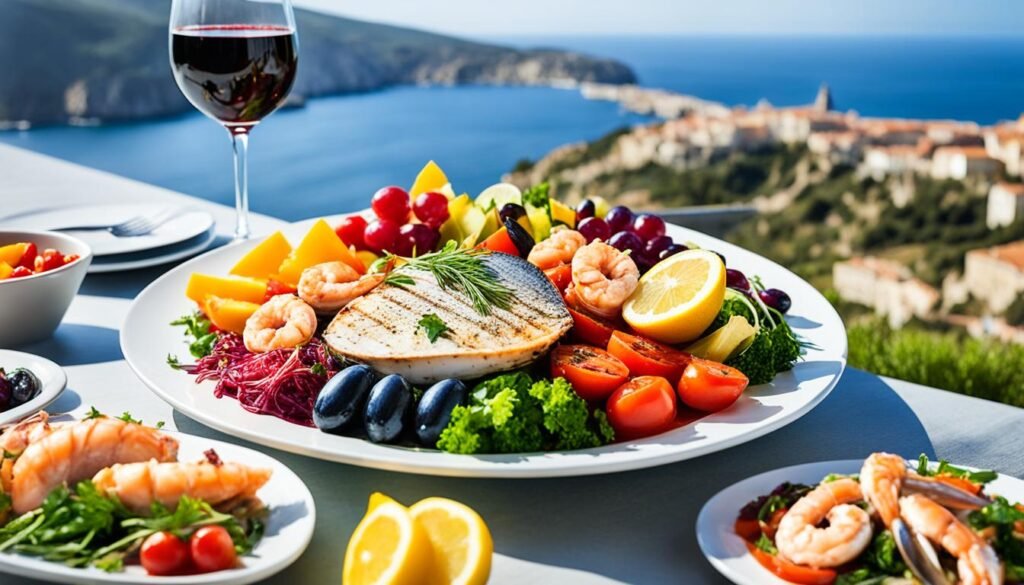Valencia Diet: Healthy Mediterranean Eating Plan

The Valencia diet draws inspiration from Valencia, Spain’s Mediterranean region. It centers on fresh, unprocessed foods like olive oil, rice, beans, nuts, fruits, and vegetables. This eating plan also highlights whole grains, legumes, and moderate portions.
An active lifestyle is a key component of the Valencia diet. By following these principles, you may achieve sustainable weight loss and improve your overall health.
Key Takeaways
- The Valencia diet is a Mediterranean-inspired eating plan focused on fresh, whole foods.
- It emphasizes olive oil, rice, beans, nuts, fruits, and vegetables as the foundation of the diet.
- The diet promotes whole grains, legumes, moderate portions, and an active lifestyle.
- Following the Valencia diet can support sustainable weight loss and improved long-term health.
- The diet shares similarities with the Mediterranean diet but has a stronger focus on lean protein and limits dairy.
What Is the Valencia Diet?
The Valencia diet comes from the coastal region of Valencia, Spain. It’s a Mediterranean-inspired eating plan that focuses on fresh, local ingredients. This approach promotes whole foods, moderate portions, and an active lifestyle.
The diet emphasizes plant-based foods like rice, vegetables, beans, and olive oil. It encourages a balanced approach to eating. The plan cuts out processed foods and added sugars.
Key Principles
- Fill 2/3 of your plate with a variety of fruits and vegetables
- Incorporate whole grains such as rice and bread into meals
- Consume 1-2 cups of legumes, like chickpeas, lentils, and beans, per week
- Use extra virgin olive oil for cooking and drizzling
- Practice portion control and stop eating when satisfied
- Aim for 30 minutes of exercise most days
The Valencia diet focuses on nutrient-dense, whole food sources. By following these principles, people may enjoy the benefits of a Mediterranean diet. These benefits can include sustainable weight loss and improved heart health.
“The Valencia diet is a way of life that promotes a holistic approach to wellness through the power of fresh, local ingredients and an active lifestyle.”
– Dr. Valencia-Lopez, Doctor of Osteopathy
Benefits of the Valencia Diet
The Valencia diet offers numerous benefits for health and well-being. It’s inspired by Mediterranean eating habits. This plan focuses on whole foods, fresh produce, and healthy fats.
The Valencia diet supports sustainable weight loss. It emphasizes fiber-rich foods and limits processed items. This approach can boost metabolism and fat-burning when combined with regular exercise.
The diet also promotes improved heart health. Heart-healthy fats from olive oil and fish can lower blood pressure and cholesterol. Whole grains and produce provide antioxidants that support cardiovascular well-being.
Following the Valencia diet may increase longevity. Studies show Mediterranean-style eating can add years to one’s life. This balanced approach creates a recipe for health and vitality.
The Valencia diet combines weight management, heart health, and longevity benefits. It allows you to enjoy vibrant flavors while nourishing your body effectively.
What to Eat on the valencia diet
The Valencia diet draws inspiration from Spain’s Mediterranean region. It focuses on fresh, local ingredients that nourish the body. This approach balances healthy eating with delightful flavors.
Sample Meal Plan
A typical day on the Valencia diet might include:
- Breakfast: Greek yogurt with berries and a sprinkle of nuts
- Lunch: Grilled chicken salad with chickpeas and a warm pita bread
- Snack: An apple paired with a slice of cheese
- Dinner: Seafood paella with brown rice and steamed broccoli
- Dessert: Yogurt with honey and fresh berries
The Valencia diet centers on lean proteins and whole grains. It also includes legumes, fruits, vegetables, and healthy fats like olive oil.
This Mediterranean-inspired approach limits red meat and processed foods. Instead, it prioritizes plant-based recipes and seafood paella.
The Valencia diet offers a tasty way to support a balanced lifestyle. It combines delicious flavors with nutritional benefits for overall well-being.
Fresh Produce: Foundation of the Diet
Fresh, seasonal fruits and vegetables are the core of the Valencia diet. These foods make up two-thirds of each meal. They provide essential vitamins, minerals, and antioxidants for health and weight management.
Oranges, rich in vitamin C and fiber, are a Valencia diet staple. Tomatoes contain lycopene, which may help reduce cancer risk. Olive oil offers antioxidants and healthy fats for heart health.
The diet includes artichokes, olives, and almonds. Almonds provide healthy fats, fiber, and antioxidants. These foods add variety and nutrients to meals.
Quinoa, a gluten-free grain, is high in protein and amino acids. Legumes like chickpeas and lentils offer plant-based protein. Fish such as salmon and sardines provide omega-3 fatty acids for heart health.
The Valencia diet’s focus on diverse produce ensures followers get many beneficial nutrients. This approach supports overall well-being and promotes a healthy lifestyle.
Whole Grains and Legumes
The Valencia diet focuses on wholesome, nutrient-dense foods. Whole grains and legumes are key components. They provide essential vitamins, minerals, and plant-based protein.
Whole grains like brown rice and whole wheat bread are Valencia diet staples. These complex carbs offer steady energy and fiber for digestive health. Legumes such as chickpeas, lentils, and beans are rich in plant-based protein.
The Valencia diet recommends 1-2 cups of legumes weekly. This creates a balanced and nourishing eating pattern. Whole grains and legumes provide essential nutrients and promote fullness.
- Whole grains like whole wheat and brown rice are central to the Valencia diet, offering complex carbohydrates, fiber, and B vitamins.
- Legumes, such as chickpeas and lentils, are emphasized as excellent sources of plant-based protein, fiber, and minerals.
- Incorporating 1-2 cups of legumes per week is a key recommendation of the Valencia diet for a balanced, satisfying, and nutritious eating plan.
The Valencia diet’s focus on whole grains and legumes supports overall health. It encourages diverse, plant-based foods that nourish the body. This balanced approach makes it a sustainable and wholesome lifestyle choice.
Olive Oil: The Healthy Fat
Olive oil is a key part of the Valencia diet. Extra virgin olive oil is full of monounsaturated fats. These fats can lower cholesterol and reduce heart disease risk.
The Valencia region has grown olive trees for centuries. They make some of the world’s best extra virgin olive oils. These oils come from the first cold pressing of olives.
Mediterranean cooking often uses extra virgin olive oil. It adds flavor and nutrients to many dishes. The Valencia diet promotes using this healthy fat freely in meals.
Eating a Mediterranean diet with extra virgin olive oil has many benefits. It may lower the risk of heart disease and diabetes. It can also help with healthy blood sugar and weight control.
| Nutrient | Amount per 1 Tbsp (13.5g) of Extra Virgin Olive Oil |
|---|---|
| Calories | 119 |
| Total Fat | 13.5g |
| Saturated Fat | 1.9g |
| Monounsaturated Fat | 9.8g |
| Polyunsaturated Fat | 1.4g |
| Vitamin E | 1.9mg |
The Valencia diet uses extra virgin olive oil in many ways. You can use it for cooking veggies or topping salads. This healthy fat is key to the Mediterranean-style eating in the Valencia diet.
Moderate Portions and Active Lifestyle
The Valencia diet champions moderate portions and an active lifestyle. Valencians typically eat until satisfied, not full. This approach helps maintain a healthy weight and prevents overeating.
Many Valencians include physical activity in their daily routines. The diet suggests at least 30 minutes of exercise most days. Walking and biking are popular ways to stay active.
“Maintaining a balanced diet with moderate portions and regular physical activity is the foundation of the Valencia diet and overall Mediterranean approach to healthy living.”
Studies show that portion control and daily exercise offer significant benefits. Evidence suggests childhood overweight rates have plateaued. This highlights the importance of teaching healthy habits early on.
By following the Valencia diet’s principles, people can build a more sustainable lifestyle. It’s a path to better health and fulfillment.

| Dietary Factor | Recommended Intake |
|---|---|
| Portion Size | Moderate, stop eating when satisfied |
| Physical Activity | At least 30 minutes per day, most days of the week |
Wine: Optional Accompaniment
Red wine often accompanies dinner in Mediterranean diets. The Valencia diet, however, considers wine optional. Followers can choose moderate red wine or non-alcoholic drinks based on their needs.
The article suggests several wine pairings for Prego. Dão wine offers red fruit notes and oaky undertones. It complements the savory flavors of this Portuguese steak sandwich.
Douro wines boast rich fruit and complex structure. They enhance the steak’s flavors and its accompaniments. Toro Tempranillo from Spain provides cherry and fig notes.
This Spanish wine balances the steak’s richness with slight acidity. Alentejo, Portugal’s rising star, features concentrated red blends. Its blueberry, plum, and dark chocolate notes add unique dimensions.
The article focuses on balancing Prego’s rich, savory flavors. Top sommeliers Theodoros Gkrimpizis, Alessandra Andreani, and Hugo Sánchez contributed to this content.
“Those following the diet can choose to include a moderate amount of red wine or opt for a non-alcoholic beverage, depending on personal preference and dietary needs.”
Transitioning to the Valencia Diet
The Valencia diet offers a path to healthy eating habits. It’s inspired by Mediterranean cuisine and focuses on whole foods. This diet can help you develop sustainable eating patterns.
To start a mediterranean diet transition, add more fresh foods to your meals. Gradually increase your intake of fruits, vegetables, and whole grains. These nutrient-rich foods are the core of the Valencia diet.
Tips for Success
Begin by reducing processed and high-sugar foods. Replace them with wholesome ingredients rich in vitamins and minerals. This shift will help you adapt to the Valencia diet’s principles.
Practice mindful eating to support sustainable lifestyle changes. Savor your food and pay attention to hunger cues. Share meals with others to create a positive dining experience.
Regular exercise is crucial for the Valencia diet’s success. Aim for 150 minutes of moderate or 75 minutes of vigorous activity weekly. Choose activities you enjoy, like walking, swimming, or cycling.
Remember, adapting to the Valencia diet takes time. Be patient and celebrate small wins along the way. Consult healthcare professionals for personalized guidance on your dietary journey.

| Key Principles of the Valencia Diet | Benefits of the Valencia Diet |
|---|---|
|
|
Comparison with the Mediterranean Diet
The Valencia diet and Mediterranean diet share many similarities. Both focus on plant-based foods, whole grains, and heart-healthy fats like olive oil. The Valencia diet allows more dairy and eggs than the Mediterranean diet.
These diets promote weight loss, improve heart health, and support longevity. They offer balanced, nutrient-dense eating plans. The Mediterranean region is famous for its produce, seafood, and olive oil.
Both diets share core principles. They prioritize fresh, local ingredients and limit processed foods. They also highlight the health benefits of traditional Mediterranean cuisine.
“The Mediterranean diet is recognized as one of the healthiest eating patterns in the world, and the Valencia diet is a unique expression of this tradition.”
Conclusion
The Valencia diet draws inspiration from Spain’s Mediterranean region. It focuses on fresh, whole foods and heart-healthy olive oil. This approach supports weight loss, heart health, and longevity while emphasizing vibrant flavors and community-centered meals.
The diet relies on mediterranean eating principles and antioxidant-rich produce. It’s linked to a lower risk of heart disease, certain cancers, and diabetes. By using fresh, local ingredients, it offers a sustainable path to better health.
The Valencia diet provides a flavorful framework for various health goals. It’s suitable for weight loss, managing chronic conditions, or improving overall nutrition. Embracing these principles can lead to a healthier, more vibrant life.
FAQ
What is the Valencia diet?
The Valencia diet draws inspiration from Spain’s Mediterranean region. It centers on fresh, unprocessed foods like olive oil, rice, and beans. Fruits and vegetables are key components of this eating plan.
What are the key principles of the Valencia diet?
The Valencia diet emphasizes filling most of your plate with fruits and vegetables. It includes whole grains, legumes, and olive oil as staples.
This diet encourages eating until satisfied and regular exercise. Aim for 30 minutes of physical activity on most days.
What are the benefits of the Valencia diet?
The Valencia diet supports sustainable weight loss and improves heart health. It can lower blood pressure and cholesterol levels.
This balanced, nutrient-dense diet focuses on whole foods. Studies show it can promote longevity, similar to the traditional Mediterranean diet.
What does a typical day on the Valencia diet look like?
A Valencia diet day might start with Greek yogurt, berries, and nuts. Lunch could be a grilled chicken salad with chickpeas.
An afternoon snack might include an apple and cheese. Dinner could feature seafood paella with brown rice and broccoli.
What role do fruits and vegetables play in the Valencia diet?
Fruits and vegetables form the core of the Valencia diet. They should make up two-thirds of each meal.
The diet promotes a variety of fresh, seasonal produce. Examples include artichokes, tomatoes, oranges, and olives.
How do whole grains and legumes fit into the Valencia diet?
Whole grains like brown rice are staples in the Valencia diet. They provide complex carbohydrates, fiber, and B vitamins.
Legumes such as chickpeas and lentils are important protein sources. They also offer fiber and minerals.
What is the role of olive oil in the Valencia diet?
Olive oil is essential in the Valencia diet. It’s used for cooking, drizzling, and in dressings.
Extra virgin olive oil contains monounsaturated fats. These fats can lower cholesterol and reduce heart disease risk.
How does the Valencia diet approach portion control and an active lifestyle?
The Valencia diet promotes eating until satisfied, not full. It encourages moderate portions and regular physical activity.
Many following this diet incorporate daily walks or bike rides. These activities support overall health and well-being.
Is wine allowed on the Valencia diet?
The Valencia diet considers wine optional. A glass of red wine with dinner is common in Mediterranean regions.
Those following the diet can choose to include moderate amounts of wine. Non-alcoholic options are also acceptable.
How can I transition to the Valencia diet?
Start by adding more fresh, whole foods to your meals. Include fruits, vegetables, whole grains, and legumes.
Gradually reduce processed foods and added sugars. This approach can help make the transition smoother.
How does the Valencia diet compare to the Mediterranean diet?
The Valencia diet shares many traits with the Mediterranean diet. Both focus on plant-based foods, produce, and healthy fats.
However, the Valencia diet may be less strict about dairy and egg intake. It offers flexibility while maintaining core health principles.





